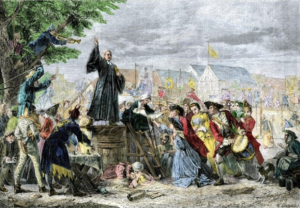Commentary by R. Clinton Ohlers

Among the chief differences between Marxist and Judeo-Christian visions of society, two stand out as both central and inviolable: truth and human nature. Judeo-Christian cultures have always perceived truth as something to be discovered or revealed, not created at will. This perspective led to the Enlightenment and the rise in scientific thought that has dominated to the present day. The truth about human nature was something to be discovered through observation and revealed by God.
For the Left, truth is something to be created. Praxis, from the Greek word for “act,” as Marx’s collaborator Frederich Engels framed it, was itself the criterion for truth. Truth was created through human action, not discovered through human observation or access to a higher source. Human nature, then, was also not fixed. Rather, it was to be molded to the conditions of truth that through action was coming into being.
America finds itself in a critical moment. Long established rights of free speech, self-defense, due process, equal treatment under the law, have all now been and are increasingly undermined if not jettisoned by governmental bureaucracies and private Big Tech corporations.
The question of fundamental beliefs, values, and democratic commitments now resurfaces. Are the rights Americans have long held dear inalienable, endowed as essential by our Creator in our human created in His image? Or, are the loss of these rights simply parts of the birthing pains of a new reality coming into being?Pastors, Priests, Rabbis, and religious leaders of multiple other traditions now find themselves in a remarkable point of history where their voices have a new relevance on matters of the fundamental character of the Republic — a relevance not equaled since 1776.
The “Black Robed Regiment” is what later historians came to refer to clergy such as George Whitefield, Thomas Mayhew, Timothy Dwight, Peter Muhlenberg and others who supported the patriots’ cause, some of whom took up arms and led regiments themselves. Patriots, loyalists, and the British crown all recognized their support as instrumental in the Revolution’s eventual success.
In those years of turmoil, Presbyterian clergymen stood out among the most vocal supporters of the Revolutionary cause. So true was this that King George III called the American War for Independence a “Presbyterian rebellion” and Prime Minister Horace Walpole quipped that “Cousin America has eloped with a Presbyterian Parson.”
To those who understand the roots of Presbyterianism in the writings of John Calvin, and his famous Institutes of Christian Religion, this comes as no surprise. Calvin titled Book IV of the Institutes, “Government.” Speaking of the benefits of a mixed form of democracy, he wrote, that it
far excels all others: and that indeed not of itself, but because it very rarely happens that kings regulate themselves so that their will is never at variance with justice and rectitude; or, in the next place, that are they endued with such penetration and prudence, as in all cases to discover what is best. The vice or imperfection of men therefore renders it safer and more tolerable for the government to be in the hands of many, that they may afford each other mutual assistance and admonition, and that if any one arrogate to himself more than is right, the many may act as censors and masters to restrain his ambition.
Looking to the responsibility to restrain such ambition, he continued:
And to this object the magistrates likewise aught to apply their greatest diligence, that they suffer not the liberty, of which they are constituted guardians, to be in any respect diminished, much less to be violated: if they are inactive and unconcerned about this, they are perfidious to their office, and traitors to their country.
Following in his footsteps, Theodore Beza and other theologians of the Reformation built on these ideas. From them we have our concepts of self-governance, representative democracy, balance of power, and the right — even the duty — of those loyal to the constitution of the government to defend with arms if necessary against a monarch acting illegally.
At present, long accustomed to avoid politics both to keep from alienating diverse members of their congregations and in the interest of abiding by the strictures of their tax-exemption, religious leaders in America now face a time in which political options and the accompanying speech have moved beyond support of one party or candidate. The very foundation of our governance and freedoms established in the Bill of Rights is at question. Americans and American ministers now facing a test of whether they believe those rights truly are inalienable and endowed, or arbitrary and passing.
Religious leaders stand in a unique position of having large platforms of influence out of the reach of Cancel Culture and without critical reliance on Big Tech for their weighty influence. They speak directly to their congregations and when they use streaming technologies typically do so through the platform of their own church website.
If American pastors and religious leaders believe the discipline of theology has anything to inform in regard to how we order our lives under the social contract that binds us, if God Himself has any opinion on the value of these rights that the Founding Fathers believed inalienable, then as in 1776 so also now it is time for a Black-Robed Regiment to arise again from the pages of history into the present crisis and take up the cause of Liberty.
R. Clinton Ohlers, PhD is a historian of science and religion and a contributing editor for the FreePressMediaGroup. Previously, he held the position of Research Assistant Professor in the Humanities at the University of Hong Kong. His book, The Birth of the Conflict Between Science and Religion, is scheduled to appear in 2022. He received his PhD in history from the University of Pennsylvania.

You must be logged in to post a comment Login